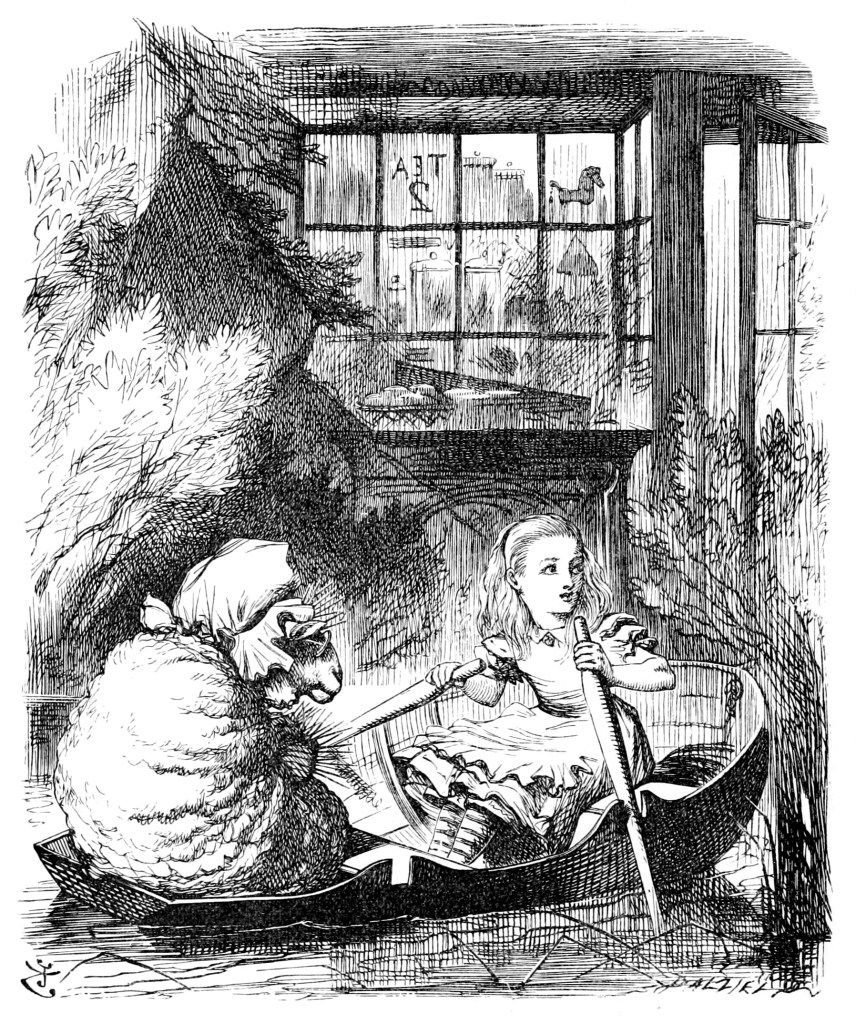Tuesday
My mother, Julia, and I returned Sunday from a Bates family reunion at the “Bates Cottage” in Maine. We saw an old relative and dear friend days before she died (at 102), caught up with our apple farmer cousins, delved into the family tree (I learned that William Bate landed in Weymouth, Massachusetts in 1636), almost hit a skunk, had a lobster feast, and generally made merry.
It was the third summer trip for my 92-year-old mother, however, and she’s ready to stop flying around the country. With less excuse, Julia and I were also exhausted, so after Julia finished up a report yesterday, we boated out on my mother’s lake and then just drifted, listening to the frogs and, as the evening came on, the katydids. I thought of Alice’s two boating experiences in Through the Looking Glass.
Both capture Carroll’s longing for lost innocence, a longing that undergirds the novel as a whole. Looking Glass is darker than Wonderland, in large part because Carroll is panicking over the fact that his child friend Alice Pleasance Liddell is growing up. Carroll finds it inexpressibly tragic that pawns turn into queens.
The book begins with a poem that spells out Alice’s full name through the first letter of each line. Although autumn frosts “have slain July,” Carroll says Alice will always haunt him “phantomwise”:
A boat beneath a sunny sky
Lingering onward dreamily
In an evening of July—
Children three that nestle near,
Eager eye and willing ear,
Pleased a simple tale to hear—
Long has paled that sunny sky:
Echoes fade and memories die.
Autumn frosts have slain July.
Still she haunts me, phantomwise,
Alice moving under skies
Never seen by waking eyes.
Children yet, the tale to hear,
Eager eye and willing ear,
Lovingly shall nestle near.
In a Wonderland they lie,
Dreaming as the days go by,
Dreaming as the summers die:
Ever drifting down the stream—
Lingering in the golden gleam—
Life, what is it but a dream?
The character Alice also encounters dream evanescence as she gathers rushes from a rowboat that she shares with a knitting sheep. Being a child, she doesn’t pay much attention to the fact that the rushes are fading but the narrator certainly does:
So the boat was left to drift down the stream as it would, till it glided gently in among the waving rushes. And then the little sleeves were carefully rolled up, and the little arms were plunged in elbow-deep to get the rushes a good long way down before breaking them off—and for a while Alice forgot all about the Sheep and the knitting, as she bent over the side of the boat, with just the ends of her tangled hair dipping into the water—while with bright eager eyes she caught at one bunch after another of the darling scented rushes.
‘I only hope the boat won’t tipple over!’ she said to herself. ‘Oh, what a lovely one! Only I couldn’t quite reach it.’ ‘And it certainly did seem a little provoking (‘almost as if it happened on purpose,’ she thought) that, though she managed to pick plenty of beautiful rushes as the boat glided by, there was always a more lovely one that she couldn’t reach.
‘The prettiest are always further!’ she said at last, with a sigh at the obstinacy of the rushes in growing so far off, as, with flushed cheeks and dripping hair and hands, she scrambled back into her place, and began to arrange her new-found treasures.
What mattered it to her just then that the rushes had begun to fade, and to lose all their scent and beauty, from the very moment that she picked them? Even real scented rushes, you know, last only a very little while—and these, being dream-rushes, melted away almost like snow, as they lay in heaps at her feet—but Alice hardly noticed this, there were so many other curious things to think about.
Julia and I didn’t notice anything fading as we drifted in Lake Eva. It all seemed magical, as though time had stopped. If I were to lose Julia, however—”What fond and wayward thoughts will slide/Into a lover’s head!” Wordsworth exclaims when imagining that Lucy has died—then I would feel as Carroll feels.
